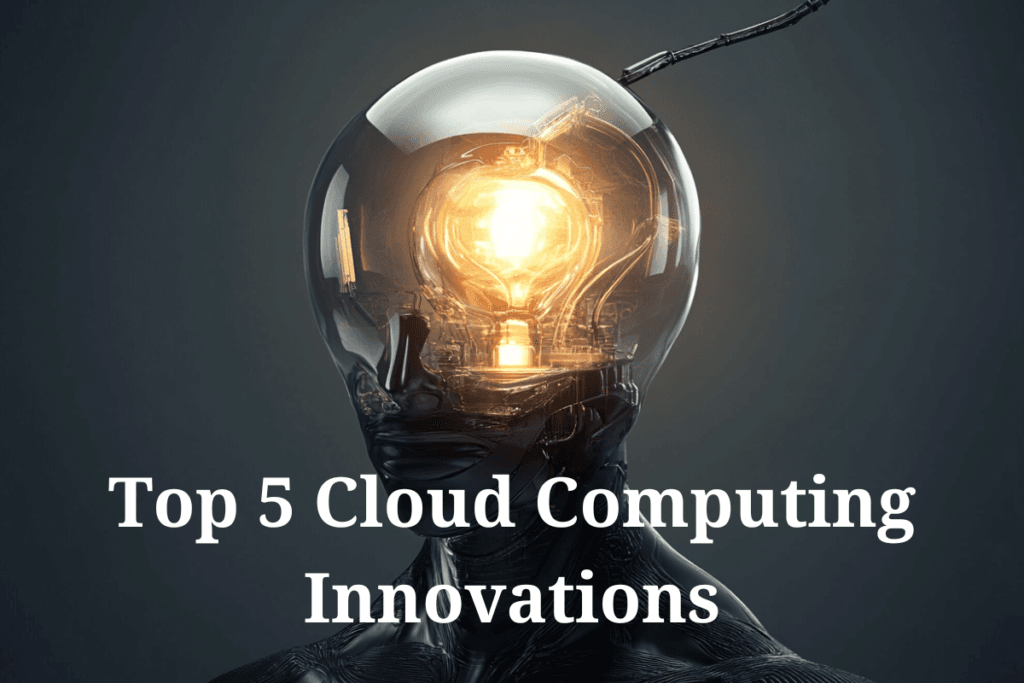Top 5 Cloud Computing Innovations Transforming 2025: 5 Powerful Trends to Supercharge Your Business
In 2025, cloud computing continues to revolutionize how businesses operate and innovate. With rapid advancements in cloud computing ai solutions and an ever-growing array of cloud computing managed services, companies are leveraging the cloud to drive efficiency, enhance security, and foster scalability. In this in-depth article, we explore the top five cloud computing innovations that are not only reshaping the digital landscape but are also redefining industry best practices for data security in cloud computing and network security in cloud computing.
1. The Rise of AI-Driven Cloud Services
Artificial Intelligence has been a game changer in the cloud computing sector. The integration of cloud computing ai into cloud services has led to unprecedented efficiencies, automated processes, and improved decision-making capabilities. Cloud providers such as IBM Cloud and Amazon Web Services are investing heavily in AI technologies that streamline operations and offer predictive analytics.
AI-Powered Automation and Predictive Analytics
Cloud platforms are now embedding machine learning algorithms to automate routine tasks such as resource allocation, system monitoring, and load balancing. This means that businesses can focus on strategic initiatives while the cloud infrastructure optimizes itself in real-time. For instance, when demand spikes, AI-driven algorithms can predict the need for additional resources, ensuring a smooth and uninterrupted user experience. This is a significant leap for cloud computing ai that not only improves performance but also reduces operational costs.
Enhanced User Experiences Through Intelligent Services
The advent of AI in cloud computing has also resulted in more personalized and intuitive user experiences. Intelligent chatbots, recommendation engines, and automated customer support systems are becoming the norm. These advancements enable companies to offer a higher level of service, thereby increasing customer satisfaction and loyalty. Moreover, the convergence of cloud computing ai and data analytics is helping businesses uncover insights that were previously hidden, driving innovation and competitive advantage.
Real-World Success Stories
Several enterprises have successfully integrated AI into their cloud strategies. For example, global retailers are leveraging AI to optimize supply chains, while financial institutions use machine learning models to detect fraudulent activities. These success stories underscore the transformative impact of cloud computing ai on business processes and profitability.
2. Expansion and Optimization of Cloud Computing Managed Services
The evolution of cloud computing managed services has been a cornerstone of digital transformation in 2025. Managed services allow organizations to outsource the management, maintenance, and monitoring of their cloud environments, ensuring that they can focus on core business activities. Providers like Microsoft Azure and Google Cloud have refined their managed services to offer unparalleled support and expertise.
What Are Cloud Computing Managed Services?
Cloud computing managed services encompass a range of offerings that include infrastructure management, software updates, security monitoring, and performance optimization. These services provide businesses with a turnkey solution, minimizing downtime and reducing the need for in-house IT expertise. As a result, more organizations are turning to cloud computing managed services to ensure reliability and scalability.
Key Benefits for Businesses
The advantages of leveraging managed services are manifold:
- Cost Efficiency: Outsourcing cloud management helps cut down on staffing and training expenses.
- Expert Support: Managed service providers offer round-the-clock monitoring and technical expertise.
- Scalability: Services can be scaled up or down based on business needs, providing flexibility during growth spurts or economic downturns.
- Enhanced Security: Managed services integrate robust security measures, ensuring data security in cloud computing and network security in cloud computing.
Adapting to Modern Business Demands
In today’s digital era, businesses must remain agile and responsive. The adoption of cloud computing managed services enables companies to stay ahead of technological disruptions and capitalize on emerging trends without overhauling their existing IT infrastructure. This strategic approach is pivotal for sustaining competitive advantage in an increasingly dynamic market.
3. Quantum Computing Integration: The New Frontier
Quantum computing is rapidly transitioning from a futuristic concept to a practical tool available through the cloud. This innovation promises to solve complex problems that are beyond the reach of classical computing systems. Leading cloud providers are now offering Quantum Computing as a Service (QCaaS), which opens up new avenues for research and business applications.
Understanding Quantum Computing as a Service (QCaaS)
QCaaS allows organizations to access quantum processors through the cloud, enabling them to perform calculations at speeds unimaginable with conventional computers. This service is particularly useful for industries that require high-level computations, such as cryptography, financial modeling, and materials science. By harnessing the power of quantum computing, businesses can drive breakthroughs in innovation and efficiency.
Real-World Applications and Impact
Some of the most promising applications of quantum computing include:
- Financial Services: Enhancing risk analysis and optimizing investment portfolios.
- Healthcare: Accelerating drug discovery and advancing genomics research.
- Logistics and Supply Chain: Streamlining operations through complex simulations and predictive models.
As quantum computing moves into the mainstream, it is expected to complement traditional cloud services, creating a hybrid model that leverages both classical and quantum computing strengths. This evolution represents a major leap forward in technology and offers exciting possibilities for future innovations.

4. Enhanced Security Measures in Cloud Computing
Security remains one of the top priorities for businesses moving to the cloud. With the increasing sophistication of cyber threats, robust measures for data security in cloud computing and network security in cloud computing have become essential. Cloud providers are continually upgrading their security frameworks to protect sensitive information and ensure business continuity.
Zero Trust Security Models
The zero trust model is rapidly gaining traction in cloud environments. This approach is based on the premise of “never trust, always verify,” meaning that every access request—regardless of its origin—must be authenticated and authorized. By adopting zero trust, organizations can significantly reduce vulnerabilities and protect against internal and external threats. This model is a key component of both data security in cloud computing and network security in cloud computing.
AI-Powered Threat Detection and Response
One of the most exciting developments in cloud security is the integration of AI for threat detection. Advanced algorithms continuously analyze network traffic, user behavior, and system logs to identify anomalies and potential breaches in real time. This proactive approach allows for swift responses to emerging threats, minimizing damage and downtime. The blend of cloud computing ai with security protocols has led to more resilient cloud architectures that can adapt to evolving cyber threats.
Case Studies and Industry Standards
Many organizations have reported significant improvements in security after migrating to cloud environments equipped with advanced security measures. For example, healthcare providers are using secure cloud platforms to store and process sensitive patient data, ensuring compliance with regulations such as HIPAA. Additionally, financial institutions leverage these technologies to protect transaction data and customer information, thereby upholding the highest standards of data security in cloud computing and network security in cloud computing.
5. Sustainable and Green Cloud Computing
The environmental impact of data centers and cloud infrastructure is receiving increasing attention. As businesses and consumers become more eco-conscious, sustainable practices in cloud computing have emerged as a key trend in 2025.
Energy-Efficient Data Centers
Cloud providers are investing in next-generation data centers that emphasize energy efficiency and sustainability. These facilities are designed to reduce power consumption through innovative cooling systems, efficient hardware, and the integration of renewable energy sources. Companies like Google and Amazon Web Services are leading the charge, demonstrating that environmental responsibility and high-performance computing can go hand in hand.
Carbon Footprint Reduction Strategies
Reducing the carbon footprint is not just about energy-efficient hardware; it also involves rethinking resource utilization and waste management. Strategies include:
- Resource Optimization: Leveraging advanced algorithms to allocate computing resources efficiently and reduce waste.
- Renewable Energy Adoption: Transitioning data centers to solar, wind, and hydroelectric power sources.
- Innovative Cooling Techniques: Using natural cooling and liquid cooling systems to maintain optimal temperatures without excessive energy use.
- Recycling and Reuse: Implementing robust recycling programs for outdated hardware and components.
The Future of Green Cloud Computing
Looking ahead, the push for sustainability in cloud computing will continue to accelerate. Innovations in cloud computing managed services now include green solutions that not only optimize performance but also reduce environmental impact. As regulatory pressures increase and public awareness grows, businesses that adopt sustainable cloud practices will likely enjoy enhanced brand reputation and customer loyalty.
Conclusion: Embracing the Future of Cloud Computing
The year 2025 is a transformative period for cloud computing, marked by innovations that are setting new standards for efficiency, security, and sustainability. The integration of cloud computing ai is driving smarter, more responsive systems, while comprehensive cloud computing managed services are enabling businesses to stay agile and competitive. In an era where data security in cloud computing and network security in cloud computing are more crucial than ever, organizations must invest in advanced security models and AI-powered threat detection to safeguard their assets.
Furthermore, the integration of quantum computing and the expansion of edge computing are opening up unprecedented opportunities for innovation. These technologies are not only enhancing computational capabilities but are also paving the way for a future where business operations are faster, more efficient, and remarkably resilient. The fusion of classical and quantum computing paradigms will soon redefine what is possible in data processing and analysis.
Finally, as global awareness of environmental issues grows, sustainable and green cloud computing is emerging as a vital component of modern IT strategies. By investing in energy-efficient data centers and adopting robust carbon footprint reduction measures, companies can contribute to a healthier planet while reaping the benefits of high-performance cloud solutions.
In summary, the top five cloud computing innovations discussed in this article offer a glimpse into a future where technology is seamlessly integrated with business strategy. Companies that embrace these trends will not only enjoy operational efficiencies and enhanced security but will also position themselves at the forefront of digital transformation. As the industry continues to evolve, staying informed and agile will be key to thriving in an increasingly competitive landscape.
For further insights and updates on cloud computing trends, consider exploring resources from industry leaders such as IBM Cloud Learning, Microsoft Azure, and Google Cloud Solutions.
By staying ahead of these emerging trends and continuously refining your cloud strategy, you can ensure that your business is well-equipped to face the challenges of tomorrow. Whether it’s harnessing the power of cloud computing ai, leveraging state-of-the-art cloud computing managed services, or prioritizing both data security in cloud computing and network security in cloud computing, the future of cloud computing is bright, innovative, and full of opportunity.



